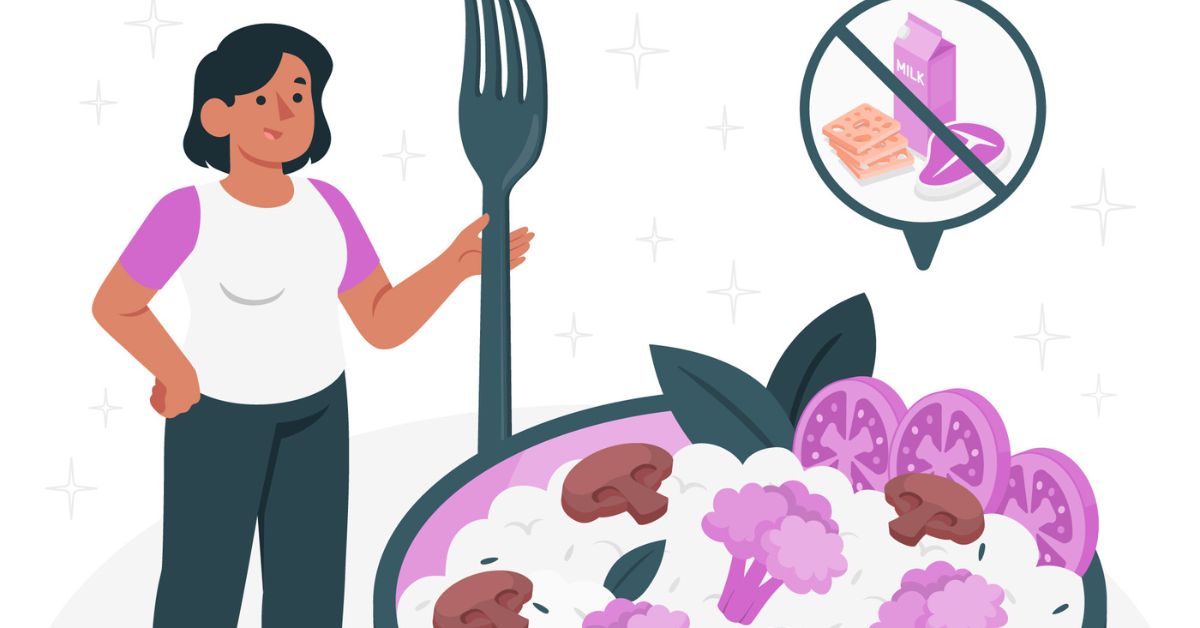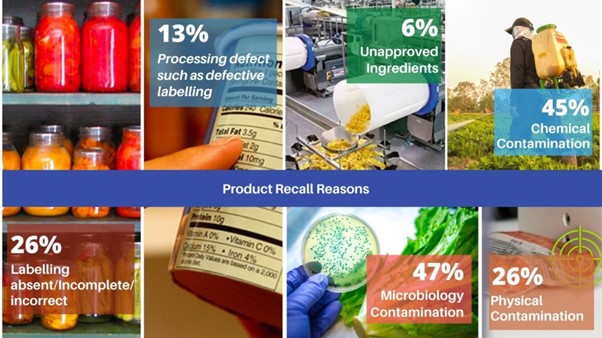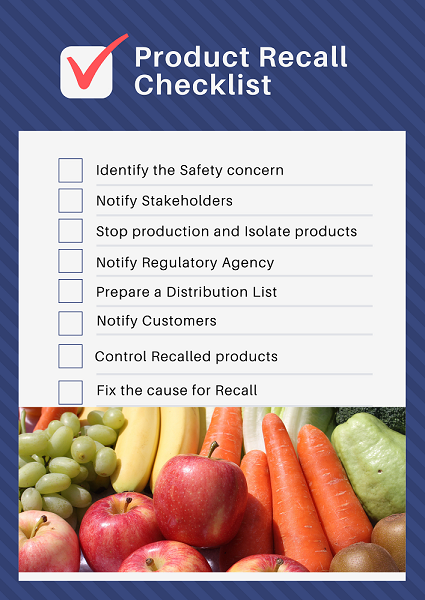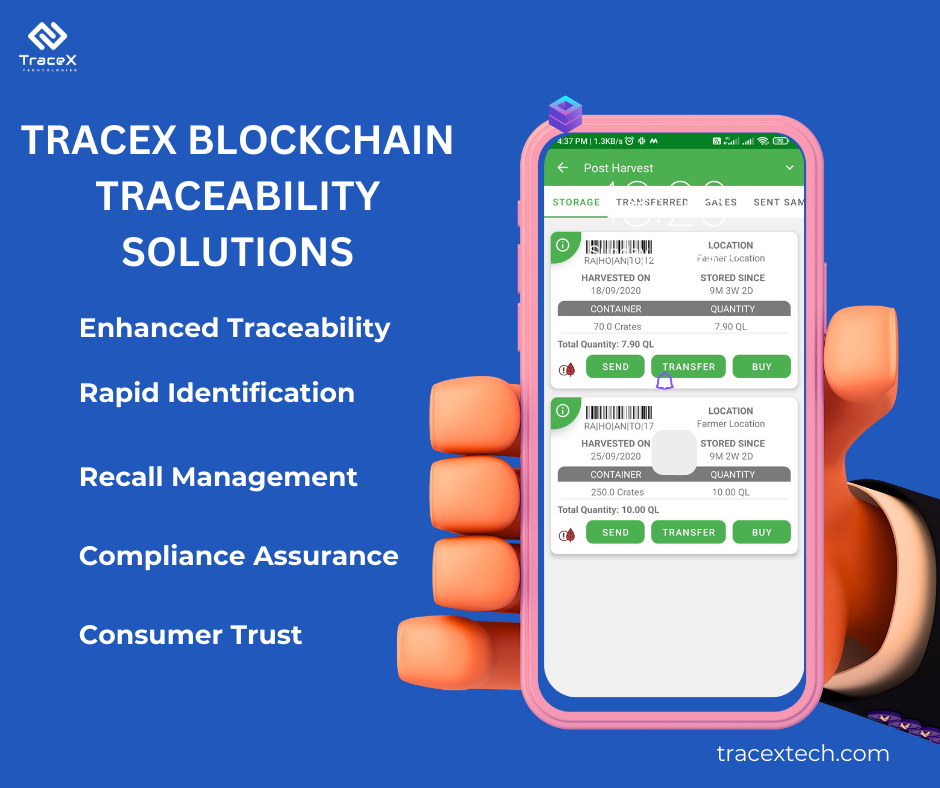Contact: +91 99725 24322 |
Menu
Menu
Quick summary: Food recalls are an essential safety mechanism used by companies and regulatory authorities to protect consumers from potentially harmful products. Whether due to contamination, labeling issues, or packaging defects, a food recall can have serious health implications and create widespread concern. Understanding how food recalls work, why they happen, and how to respond can help consumers make informed decisions and stay safe.

Have you ever wondered what triggers those sudden food recall alerts that disrupt your shopping routine? Food recalls are more common than you might think, and they can affect everything from fresh produce to packaged snacks. Most consumers are left unaware until it’s too late, leading to potential health risks
Food recalls are a critical aspect of food safety and consumer protection, ensuring that potentially harmful products are swiftly removed from the market. Understanding the intricacies of food recalls is essential for consumers to make informed decisions about the products they consume. From the reasons behind recalls to the impact on public health and brand reputation, delving into the world of food recalls unveils a complex and vital process.
Key Takeaways
Food recalls are formal actions taken by food manufacturers, distributors, or government agencies to remove or correct products from the market that may pose a health or safety risk to consumers. These recalls occur when there is evidence that a food product may be contaminated, mislabelled, or otherwise unsafe for consumption. Understanding food recalls is crucial as they play a fundamental role in protecting public health and ensuring food safety standards are upheld.
Food recalls serve as a vital safeguard against potential health hazards posed by contaminated or unsafe food products. By understanding food recalls, consumers can make informed decisions about the products they purchase and consume, reducing the risk of exposure to harmful pathogens, allergens, or other contaminants. Additionally, being aware of food recalls enables consumers to take prompt action if they have purchased or consumed a recalled product, such as seeking medical attention or disposing of the product safely. Moreover, understanding food recalls empowers consumers to advocate for transparency and accountability within the food industry, promoting a culture of safety and accountability. Overall, having knowledge about food recalls is essential for protecting both individual and public health, underscoring the importance of staying informed about food safety issues.
Class I recalls involve products that pose a significant health risk or potential for serious adverse health consequences or death. These recalls are initiated when there is a reasonable probability that consuming the product will cause severe health problems or death. Examples include food products contaminated with pathogens like Salmonella, Listeria, or E. coli. Class I recalls require immediate action to remove the product from the market and notify consumers to prevent further harm.
Class II recalls involve products that may cause temporary or medically reversible adverse health consequences. While the risk associated with Class II recalls is lower than Class I, there is still a possibility of health issues if the product is consumed. These recalls are initiated when there is a remote probability of adverse health effects or when the risk is less severe than Class I. Examples include undeclared allergens in food products or products with minor labelling errors.
Class III recalls involve products that are unlikely to cause adverse health effects but violate FDA regulations or standards. These recalls typically involve products with minor violations or defects that do not pose a significant health risk. Class III recalls may include labelling errors, packaging defects, or quality issues that do not directly impact consumer safety. While the risk associated with Class III recalls is minimal, corrective action is still necessary to maintain compliance with regulatory standards and ensure product quality.
Food recalls occur due to various reasons:

Microbiological contamination occurs when food products become contaminated with harmful bacteria, viruses, parasites, or other microorganisms. Common pathogens involved in food recalls include Salmonella, Listeria monocytogenes, Escherichia coli (E. coli), and Campylobacter. These contaminants can cause foodborne illnesses and pose a significant health risk to consumers. Contamination can occur during food production, processing, handling, or storage, leading to the initiation of a recall to prevent the spread of illness.
Allergen mislabelling occurs when a food product contains undeclared allergens or allergen traces not listed on the product label. Common food allergens include peanuts, tree nuts, milk, eggs, soy, wheat, fish, and shellfish. Allergen mislabelling can occur due to cross-contact during manufacturing, improper labelling, or failure to declare allergens in ingredient lists. For individuals with food allergies or sensitivities, consuming allergen-contaminated products can trigger allergic reactions, ranging from mild symptoms to life-threatening anaphylaxis.
Foreign material contamination involves the presence of physical objects or substances in food products that are not intended for human consumption. Examples of foreign materials include metal fragments, plastic pieces, glass shards, stones, insects, or other extraneous matter. Contamination can occur at various stages of the food production process, including harvesting, processing, packaging, or transportation. Foreign material contamination poses a choking hazard or physical.
injury risk to consumers, necessitating the initiation of a recall to remove affected products from the market.
Other safety concerns encompass a broad range of issues that may compromise the safety, quality, or integrity of food products. These concerns can include chemical contamination, such as pesticide residues or excessive levels of contaminants like heavy metals, toxins, or adulterants. Additionally, food recalls may be initiated due to packaging defects, improper storage conditions, or misbranding issues unrelated to allergens. Any safety concern that could pose a risk to consumer health or violate regulatory standards may prompt the initiation of a food recall.

As per the World Health Organization (WHO), unsafe food is responsible for causing 600 million cases of foodborne diseases and 420,000 deaths annually.
Food recalls pose significant risks to consumer health, as consuming contaminated or unsafe food products can lead to foodborne illnesses and adverse health effects. Depending on the nature of the contamination, consumers may experience symptoms ranging from mild gastrointestinal discomfort to severe illness, hospitalization, or even death. Vulnerable populations, such as children, elderly individuals, pregnant women, and those with weakened immune systems, are at increased risk of experiencing severe health consequences from consuming contaminated food products.
Based on our 2021 Consumer Sentiment Report, 18% of consumers indicated they would discontinue their association with a brand following a recall attributed to consumer illness. Additionally, 43% stated they would temporarily disengage from the brand for several months before potentially returning. These findings underscore the enduring and costly repercussions recalls can inflict on brands.
Food recalls can cause substantial damage to the reputation and credibility of food manufacturers, distributors, and retailers involved in the recall. Negative media coverage, public scrutiny, and consumer distrust may tarnish the brand’s image and erode consumer confidence in the company’s products. A tainted reputation resulting from a food recall can have long-lasting consequences, leading to decreased sales, loss of market share, and diminished brand loyalty. Rebuilding trust and restoring the brand’s reputation often requires significant time, effort, and resources. Conscious consumers prioritize buying products that align with their values—sustainably sourced, ethically produced, and safe for consumption. When a food recall occurs, it highlights potential lapses in quality control and transparency, shaking consumer trust
Food recalls cost companies an average of $10 million in direct costs alone, according to a study by the Food Marketing Institute and the Grocery Manufacturers Association (GMA) in the US.
Food recalls can result in significant economic losses for businesses across the food supply chain. Direct costs associated with recalls include expenses related to product disposal, corrective actions, and regulatory compliance. Indirect costs may arise from lost sales, reduced consumer demand, and decreased market share. Additionally, companies may incur expenses related to legal fees, settlements, and insurance premiums. The financial impact of a food recall can be substantial, particularly for small businesses or those without adequate risk management strategies in place.
Noncompliance with regulations and the occurrence of a recall can result in substantial fines for your business, along with significant time spent navigating audits and compliance procedures. Implementing targeted measures to mitigate the likelihood of future incidents is essential to avoid such consequences.
Food recalls may trigger legal consequences for the parties involved, including food manufacturers, distributors, retailers, and other stakeholders in the supply chain. Failure to promptly initiate a recall or adequately address safety concerns may result in regulatory enforcement actions, fines, or penalties from government agencies such as the Food and Drug Administration (FDA) or the United States Department of Agriculture (USDA). In cases where consumers have been harmed or incurred damages as a result of consuming recalled products, companies may face civil litigation, class action lawsuits, or product liability claims seeking compensation for injuries, medical expenses, and other losses. Compliance with food safety regulations and prompt, transparent response to recall events can help mitigate legal risks and liabilities associated with food recalls.
When a food safety issue arises, food traceability allows companies to quickly identify the source of contamination, trace the product through every stage of the supply chain, and remove it from circulation. This minimizes risks to consumers, reduces the scope of the recall, and builds consumer trust. Effective traceability also helps businesses comply with safety regulations and prevent future incidents by identifying weak points in the supply chain.
Comprehensive end-to-end supply chain traceability holds immense value for a company. Being able to pinpoint the precise location of a product down to the batch-lot level at any stage of your supply chain offers enhanced transparency for both your company and consumers. It grants you complete insight into your ingredients and products. Moreover, this level of visibility enables you to detect potential risks within the supply chain, such as identifying contamination incidents before reaching the consumer, allowing you to adopt a proactive approach to food safety.
It plays a crucial role in preventing and managing food recalls. When businesses have clear visibility into each step of their supply chain—from sourcing to distribution—they can quickly identify the origin of any contamination or safety issue. This speeds up the recall process and minimizes the impact on consumers. Moreover, transparent supply chains build trust by ensuring that products are ethically sourced and safely handled, which is key in maintaining consumer confidence during a recall event.
Inaccurate labelling, particularly the omission of allergens, ranks among the leading causes of food recalls as per the FDA. Consider leveraging tools or solutions, such as Genesis Foods, to generate government-compliant and precise food labels, thereby reducing the risk of mislabelling-related recalls. Prioritizing the accuracy of product labelling and the declaration of allergens from the outset serves as a preventive measure against costly errors and potential health hazards in the future.
Guaranteeing food safety and quality is not merely a recommendation; it is a legal requirement enforced by the government. Therefore, it is imperative for your company to remain informed about existing laws and regulations, spanning both national and state levels, to ensure that your current processes, systems, and procedures adhere to food safety standards. Food safety regulations encompass a broad spectrum, ranging from recall protocols to guidelines on recordkeeping and documentation. Understanding these facets of supply chain safety is paramount, and in cases where you may feel uncertain, seeking guidance from regulatory experts can provide valuable assistance.
While companies can implement various preventive measures in their daily operations to reduce the likelihood of a food product recall, there remains a possibility that one may occur. Therefore, it is imperative to ensure that your team is well-versed in the necessary steps to handle a food recall effectively. Once you have developed a recall plan, it is essential to train your staff through simulated recall exercises. Acting promptly and efficiently in the event of a recall can help mitigate additional costs, limit further harm to brand reputation, and ultimately minimize the overall impact.
What should we do if we have bought a recalled product?
The TraceX food traceability platform is a blockchain-based solution that ensures end-to-end transparency and accountability in food supply chains. It enables businesses to track food products from farm to fork, providing real-time visibility into sourcing, processing, and distribution. By digitizing the supply chain, TraceX helps improve food safety, reduce waste, and ensure compliance with regulations. The platform enhances consumer trust by offering detailed product information, enabling businesses to verify sustainable and ethical sourcing practices.

In conclusion, understanding the intricacies of food recalls is paramount for businesses operating in the food industry. By being proactive and staying informed about the reasons, processes, and impacts of food recalls, companies can better protect their consumers, safeguard their brand reputation, and ensure compliance with regulatory requirements. Implementing robust quality control measures, maintaining transparent communication channels with suppliers and consumers, and having a well-defined recall plan in place are essential steps in mitigating the risks associated with food recalls. By prioritizing food safety and taking proactive measures, businesses can navigate the challenges of food recalls with confidence, ensuring the continued success and sustainability of their operations in the dynamic food industry landscape.
Food recalls occur for several reasons, including contamination with harmful bacteria like Salmonella or E. coli, the presence of undeclared allergens, or foreign materials in the product. Other causes include improper labeling, which can lead to unintentional exposure to allergens, or packaging defects that compromise product safety.
Consumers are typically informed of food recalls through announcements from regulatory bodies like the FDA or USDA, as well as public press releases from the manufacturer. Retailers may also post recall notices in stores or online. It’s essential to stay up to date with food recall notifications to ensure your safety.
If a product you purchased is part of a recall, stop using it immediately. Follow the instructions provided by the recall notice, which may include returning the product to the store for a refund, disposing of it safely, or contacting the manufacturer for further guidance. Always check the product’s batch or lot number to confirm it’s affected by the recall.
